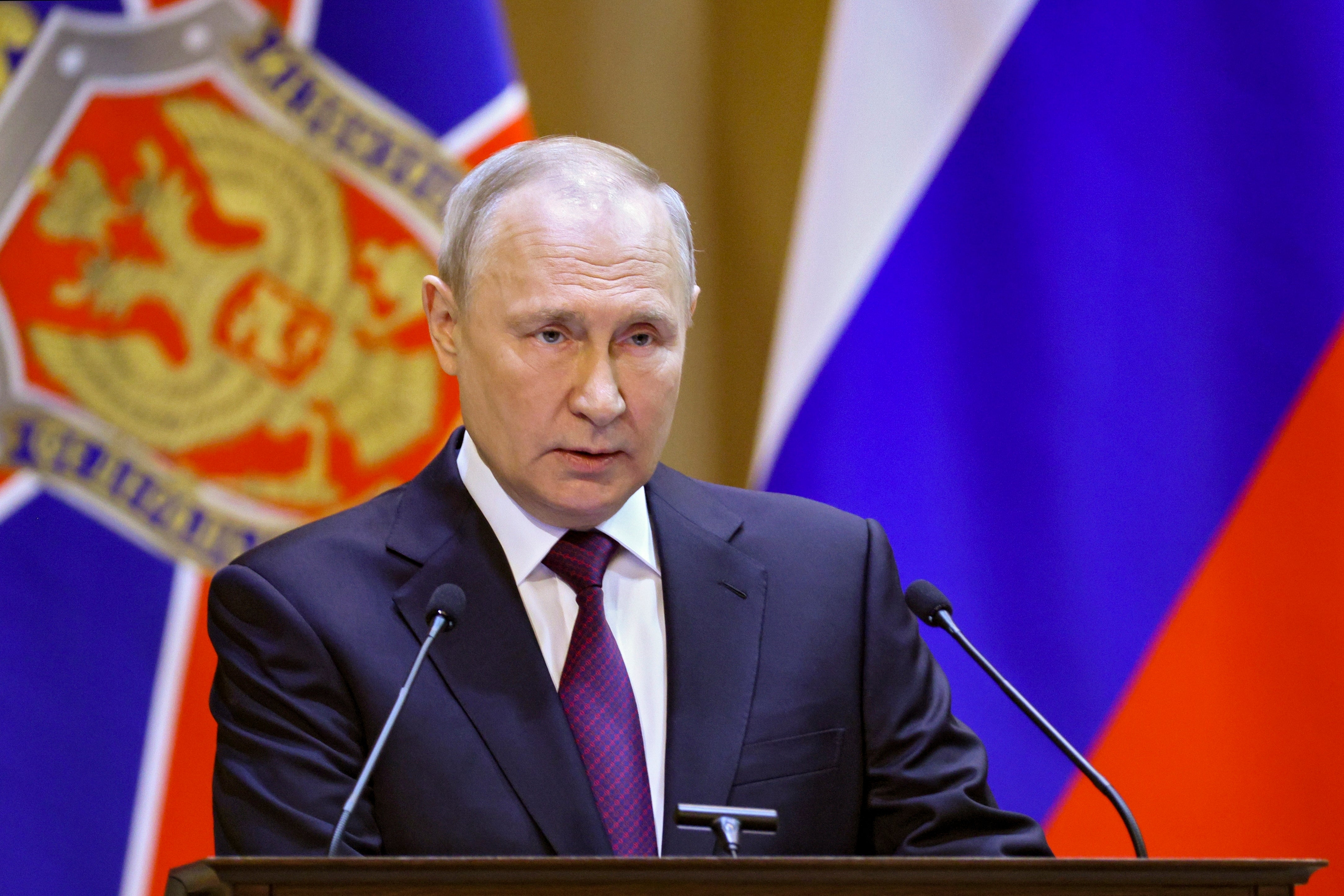Putin orders tighter security at Russia-Ukraine border after spate of drone attacks
Russian president also orders security services to counter espionage and sabotage operations by Ukraine and the West

Vladimir Putin has ordered that the Russian border with Ukraine be tightened after a spate of drone attacks while Moscow’s forces pushed to encircle the eastern city of Bakhmut.
Taking Bakhmut, the scene of some of the war’s fiercest fighting, would be Russia’s first major prize in more than six months and open the way to seizing bigger cities in the Donetsk region, one of four regions Moscow seeks to control. Ukraine’s president Volodymyr Zelensky has said the situation in Bakhmut is becoming “more and more difficult”.
Mr Putin instructed the Federal Security Service (FSB) on Tuesday to bolster security in the four regions – Donetsk, Luhansk, Kherson and Zaporizhzhia – currently only partially controlled by his forces, and also to counter what he described as growing espionage and sabotage operations against Russia by Ukraine and the West.
Mr Putin was speaking after a Russian regional governor said a drone had crashed near a natural gas distribution station in an apparent failed attack near the town of Kolomna, around 110km (70 miles) southeast of Moscow.
Ukraine does not publicly claim responsibility for attacks inside Russia, but the Kolomna incident would be its closest attempted drone strike to the Russian capital since Moscow launched its invasion of Ukraine.
Earlier, Russia’s defence ministry also accused Ukraine of launching two attempted drone attacks against two southern Russian regions overnight which caused no damage.
While Mr Putin did not refer to any specific attacks in a speech in Moscow, his comments came hours the strikes. Also on Tuesday, several Russian television stations aired a missile attack warning that officials said was a false warning and blamed on a cyberattack.
“Western intelligence services have traditionally always been actively working in Russia, and now they have thrown additional personnel, technical and other resources against us,” Mr Putin said. “We need to respond accordingly.”
In Bakhmut, the separatist leader of the self-proclaimed Donetsk People's Republic, Denis Pushilin, said “practically all roads” into the city were “under [Russian] fire control”, while the commander of Ukraine’s ground forces, Col Gen Oleksandr Syrskyi , said the situation around Bakhmut was “extremely tense”.
“Despite significant losses, the enemy threw in the most prepared assault units of Wagner, who are trying to break through the defences of our troops and surround the city,” Col Gen Syrskyi said.
Ukraine’s military said Russia was shelling settlements around Bakhmut, which lies in ruins after months of intense trench warfare.
“Over the past day, our soldiers repelled more than 60 enemy attacks,” the military said, including on the villages of Yadhidne and Berkhivka just north of Bakhmut.
In the US, the under secretary of state for defence policy, Colin Kahl, told a House of Representatives hearing that the frontline in eastern Ukraine resembles “a grinding slog”.
“So you may see small portions of territory change hands in the coming weeks and months. I do not think that there’s anything I see that suggests the Russians can sweep across Ukraine and make significant territorial gains anytime in the next year or so,” Mr Kahl said.
Across Ukraine, Moscow has also waged a campaign of missile and drone attacks on energy and other infrastructure. Russia claims these strikes are meant to weaken the enemy’s military, but the International Criminal Court’s top prosecutor, Karim Khan, has made them the subject of a visit to Ukraine.
“Generally we see clearly a pattern, I think, in terms of the number, scale and breadth of attacks against the power grids of Ukraine and we need to look at why that’s taking place; are they legitimate targets or not?” Mr Khan told reporters in Vyshhorod, outside Kyiv, where eight civilians died when a missile landed next to an apartment block in late November. “We need to find out what pattern, if any, is demonstrated by that because these are not isolated occurrences,” he added.
Elsewhere, Belarusian president Alexander Lukashenko, a close ally of Mr Putin, was set to arrive in Beijing overnight for a state visit.
Reuters contributed to this report






Join our commenting forum
Join thought-provoking conversations, follow other Independent readers and see their replies
Comments